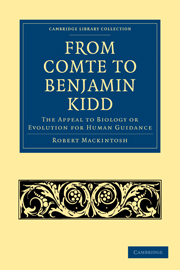Book contents
- Frontmatter
- PREFACE
- Contents
- CHAPTER I INTRODUCTORY
- PART I COMTISM, WITH SOME SCATTERED PARALLELS
- PART II SIMPLE EVOLUTIONISM—SPENCER, STEPHEN
- PART III DARWINISM, OR STRUGGLE FOR EXISTENCE
- CHAPTER XI “DARWINISM IN MORALS”—MISS COBBE'S PROTEST
- CHAPTER XII DARWINISM IN POLITICS—BAGEHOT
- CHAPTER XIII DARWINISM IN ETHICS—PROFESSOR ALEXANDER
- CHAPTER XIV REACTION FROM DARWINISM—HUXLEY
- CHAPTER XV REACTION FROM DARWINISM—DRUMMOND's “ASCENT OF MAN”
- CHAPTER XVI REITERATION OF DARWINISM: ELIMINATION MADE ABSOLUTE—MR. A. SUTHERLAND
- CHAPTER XVII THE METAPHYSICS OF NATURAL SELECTION
- PART IV HYPER-DARWINISM—WEISMANN, KIDD
- Index
CHAPTER XV - REACTION FROM DARWINISM—DRUMMOND's “ASCENT OF MAN”
Published online by Cambridge University Press: 29 August 2010
- Frontmatter
- PREFACE
- Contents
- CHAPTER I INTRODUCTORY
- PART I COMTISM, WITH SOME SCATTERED PARALLELS
- PART II SIMPLE EVOLUTIONISM—SPENCER, STEPHEN
- PART III DARWINISM, OR STRUGGLE FOR EXISTENCE
- CHAPTER XI “DARWINISM IN MORALS”—MISS COBBE'S PROTEST
- CHAPTER XII DARWINISM IN POLITICS—BAGEHOT
- CHAPTER XIII DARWINISM IN ETHICS—PROFESSOR ALEXANDER
- CHAPTER XIV REACTION FROM DARWINISM—HUXLEY
- CHAPTER XV REACTION FROM DARWINISM—DRUMMOND's “ASCENT OF MAN”
- CHAPTER XVI REITERATION OF DARWINISM: ELIMINATION MADE ABSOLUTE—MR. A. SUTHERLAND
- CHAPTER XVII THE METAPHYSICS OF NATURAL SELECTION
- PART IV HYPER-DARWINISM—WEISMANN, KIDD
- Index
Summary
I have chosen the Ascent of Man to represent the more conscious and definite reaction from unmodified or unbalanced theories of natural selection, not because its author was the first or the only writer to champion such a reaction, but because he has given us its fullest statement, and because everything of Drummond's commanded at once a very wide popularity. For another reason he interests us, because he speaks as a Christian believer and thinker,—almost as a Christian apologist. He himself confesses obligations to many predecessors; first, perhaps, to John Fiske, as we shall note in due course ; most largely and definitely to The Evolution of Sex by Professor Geddes and Professor J. A. Thomson. These last writers, like Drummond, are consciously dissenting from Darwin,—consciously putting forward amendments to his statement of things, and not only to his statement of the basis of morals, but to his scientific formulation of the process of evolution itself. Morality is to be found somewhere in the region of sex. Struggle for life is a fact, but not the whole fact; it is balanced by struggle for the life of others. Yet those who so speak are themselves evolutionists,—themselves Darwinians. They accept struggle for existence as a great fact and potent cause of progress. They deny it to be the only fact; and occasionally they are found denying that it is the only cause of progress; but that topic is very lightly touched upon.
- Type
- Chapter
- Information
- From Comte to Benjamin KiddThe Appeal to Biology or Evolution for Human Guidance, pp. 143 - 156Publisher: Cambridge University PressPrint publication year: 2009First published in: 1899



